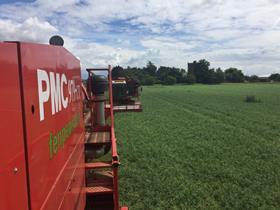
Britain produces more peas than any other European country – 130,000-140,000 tonnes a year – and sales are on the rise. But growers have faced difficult weather conditions this season, with yields expected to fall.
Fen Peas, a co-operative of 82 growers in Lincolnshire, plants 10,000t of peas a year, but this season the company expects to lose a portion of its crop to heavy rain and lower-than-average temperatures. “Because of the weather, the challenges have been great,” says the company’s managing director, Stephen Francis. “I have to work out a drilling programme, which is based on average weather. We have had virtually no winter, no spring and certainly, up to now, no summer. Average weather has gone out of the window a bit.”
Francis admits that his group will be below tonnage and therefore below budget for the year. “I will put my hand on my heart and say that we will not have a 100 per cent yield,” he says. Foot rot – when soils get waterlogged and the roots of plants decay – has also been a major difficulty this season.
Common in pea growing areas, the disease causes plants to discolour, shrivel and die – and is a problem to which Francis “would love an answer”, he says. Researchers have tried – and largely failed – to find a solution to the soil-borne pathogen for the past 50 years. But there are some preventative measures that growers can take.
“Researchers have suggested we sow the seed in certain plant spacings and densities to get the optimum yield,” Francis says. “In an ideal world the seed would grow in a square and take an even amount of nutrients from the soil. Then all the plants would grow perfectly. We’re looking now at precision drilling techniques to see if we can save costs on seed and get the plants better spaced out,” he adds.
But these growing concerns should not detract from the overall healthy state of the British pea industry. Volume sales increased by over 20 per cent in the past year, according to Kantar Worldpanel data, and industry campaign Yes Peas! appears to be paying off, having been launched over 10 years ago. The UK’s first Great British Pea Week, which took place from 11 to 17 July, aimed to improve understanding of the crop’s provenance and heritage. And Twitter posts from the event got over a million views.
Growers can also be hopeful that, since the pea harvest is heavily mechanised, they will be protected from a post-Brexit loss of seasonal labour. From the ‘tenderometers’ – which check ripeness – to the viners, and then the air blast freezers, technology is integral to the pea production line. Unlike in the cultivation of labour-intensive crops like soft fruit, apples and brassicas, manual pickers are not needed – and the farm labour that is required tends to be locally sourced.
The pea industry will also take heart from the fact that, in contrast to other crops, the UK is 90 per cent self-sufficient in pea production. This may make it slightly less vulnerable to the rising cost of imports than other fresh produce. “I don’t think anywhere is going to be immune, but it might have slightly less impact upon the pea trade,” says Tim Mudge, commercial manager at the British Growers’ Association and head of the Yes Peas! campaign.
Mudge urges caution, however: “The cost of production is impacted by several things and you need to remember that crop protection, machinery and parts are sometimes imported. This could have an impact.”



